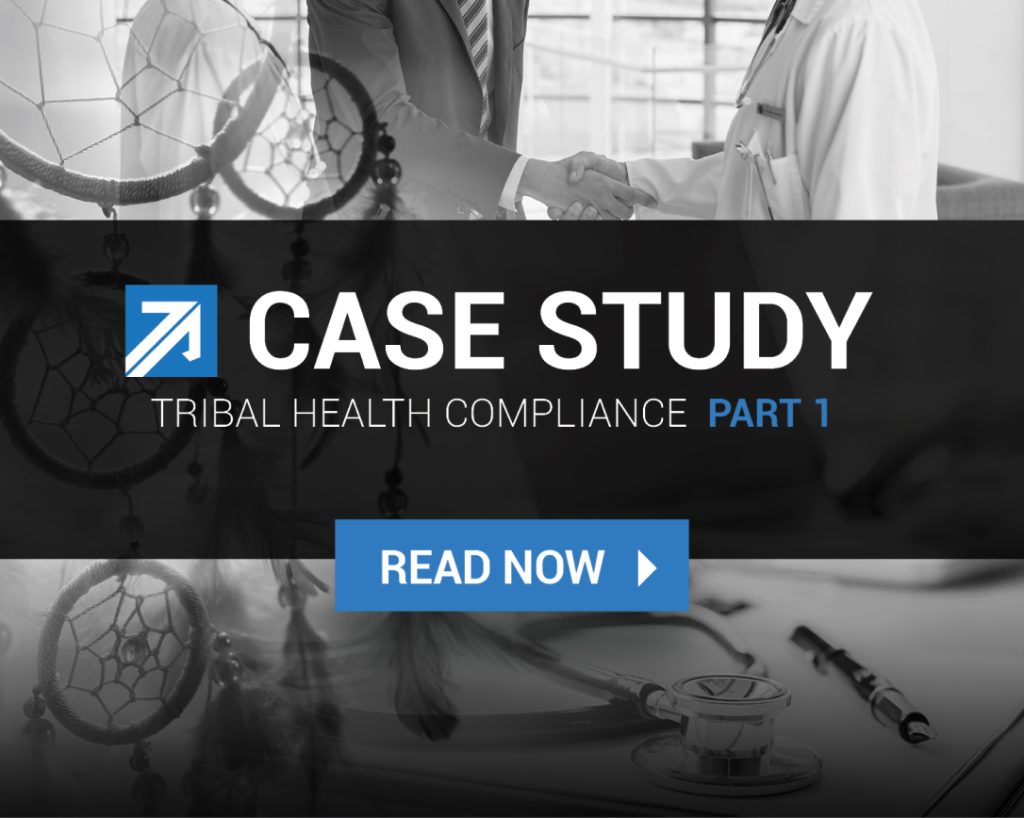

CASE STUDY: A Comprehensive Healthcare Compliance Program for a Tribal Health Client – Part 1
May 10, 2023This 2-part case study will cover the following:
- What is healthcare compliance and key parts of an effective program
- Creating a compliance program
- Communication
- Measuring success
- Return on investment
- Our Tribal health client’s unique situation
- Our Solution
What is Healthcare Compliance?
Healthcare compliance refers to the adherence of healthcare providers, organizations, and professionals to the laws, regulations, and ethical standards that govern the healthcare industry. This includes compliance with regulations such as the Health Insurance Portability and Accountability Act (HIPAA) and the Affordable Care Act, as well as industry-specific guidelines and standards.
Healthcare compliance aims to ensure that healthcare services are provided in a safe, effective, and ethical manner, while protecting patient privacy and confidentiality.
Compliance measures may include regular audits, training and education programs for staff, and the development and implementation of policies and procedures that promote compliance with regulations and ethical standards.
Healthcare compliance is essential for maintaining patient trust and ensuring the integrity of healthcare services. Non-compliance can result in legal and financial penalties, as well as damage to the reputation of healthcare organizations and professionals.
Why is Healthcare Compliance Important?
Healthcare compliance is essential for several reasons:
- Protecting patient safety: Compliance with regulations and ethical standards helps ensure that patients receive safe and effective healthcare services. It helps to prevent errors, misconduct, and malpractice that could harm patients.
- Avoiding legal and financial penalties: Non-compliance with healthcare regulations can result in legal and financial penalties, including fines, lawsuits, and loss of licensure. Compliance helps healthcare organizations and professionals avoid these consequences and maintain their reputation.
- Protecting patient privacy and confidentiality: Compliance with regulations such as HIPAA helps protect patient privacy and confidentiality. It ensures that patient information is kept secure and confidential, and that patients have control over their healthcare information.
- Promoting ethical behavior: Compliance with ethical standards helps ensure healthcare services are provided in an honest, transparent, and trustworthy manner.
Overall, healthcare compliance helps ensure that patients receive high-quality, safe, and ethical healthcare services. It protects the integrity of the healthcare industry and promotes public trust in healthcare organizations and professionals.

Creating a Compliance Program for Our Client
Creating a healthcare compliance program involved several steps. Here is a general outline of the process that we took:
- Assessed the compliance risks: Conducted a risk assessment to identify the potential compliance risks our client was facing. This involved reviewing relevant regulations and guidelines, examining their organizations policies and procedures, and interviewing staff members.
- Policies and procedures: Developed policies and procedures that addressed the compliance risks identified in the risk assessment. This included policies related to patient privacy and confidentiality, billing and coding practices, and quality of care.
- Training: Developed training programs to ensure that all staff members were aware of the organization’s compliance policies and procedures. This involved providing training on topics such as HIPAA regulations, fraud and abuse laws, and ethical standards.
- Established monitoring and auditing procedures: Established procedures to monitor and audit compliance with the organization’s policies and procedures. This includes conducting regular internal audits, reviewing billing practices, and reviewing patient records.
- Compliance Issues: Developed procedures to address compliance issues as they arise. This involved investigating potential violations, reporting violations to regulatory authorities, and taking corrective action to prevent future violations.
- Reviewed and updates to the compliance program: Implemented regular reviews and updates to the compliance program by creating a roadmap. This will ensure that they remain effective and up to date with current regulations and guidelines.
It is important to note that healthcare compliance programs can vary depending on the size and type of healthcare organization. It may be helpful to consult with a compliance expert to ensure that the organization’s compliance program meets all necessary requirements.
Communication is Critical
Communication is a critical component of any healthcare compliance program because it helps to ensure that all stakeholders understand the importance of compliance and their role in maintaining compliance.
By consistently communicating the importance of compliance, organizations can create a culture that values ethical behavior and compliance with laws and regulations. Effective communication can encourage staff and other stakeholders to report compliance concerns, such as suspected violations or areas of risk. This can help organizations to identify compliance issues early and take corrective action to prevent future violations.
Communication is also an essential tool for delivering ongoing training and education to staff. By communicating regularly about compliance requirements and providing training and education on compliance topics, organizations can ensure that staff members are equipped with the knowledge and skills needed to maintain compliance.
Additionally, effective communication enhances transparency and accountability. This can help build trust and confidence among staff, patients, and other stakeholders, and demonstrate a commitment to compliance.
By promoting awareness, encouraging reporting, supporting training and education, and enhancing transparency and accountability, communication can help organizations to maintain compliance and minimize risks.
Measuring Their Success
Measuring the success of a healthcare compliance program is essential to ensure the effectiveness in achieving its goals.
Developing compliance metrics to track progress towards meeting compliance goals may include the number of compliance violations identified and resolved, the number of staff trained on compliance policies and procedures, and the results of internal audits.
Soliciting feedback from staff and patients to understand their perceptions of the compliance program involves conducting surveys and focus groups to gather feedback on the effectiveness of compliance policies and procedures.
Regularly reviewing the results of monitoring and auditing procedures to identify trends and areas for improvement includes tracking changes in compliance metrics over time to assess the impact of the compliance program.
Assessments of the organization’s exposure to compliance risks and tracking progress in reducing these risks involved tracking the number of compliance violations, the severity of these violations, and the impact on patient safety and quality of care.
By using these methods, you can assess the effectiveness of your healthcare compliance program and identify areas for improvement. This information can help you refine your compliance program over time and ensure that it remains effective in achieving its goals.
Compliance Program Return on Investment
Measuring the return on investment (ROI) for healthcare compliance can be challenging, as it involves assessing the financial impact of a program designed to prevent financial losses and risks. However, there are several ways to evaluate ROI of healthcare compliance programs.
- Cost savings
- Increased efficiency
- Improved quality of care
- Competitive advantage
Overall, healthcare compliance programs can provide significant financial and non-financial benefits to healthcare organizations.
By tracking the costs and benefits associated with their compliance program, healthcare organizations can assess ROI and make data driven decisions about program investments and refinements.
Stay connected for Part II of our 2-part series where we discuss our Tribal health client’s compliance situation and our solutions to their challenge.
For more information regarding this case study or if you would like to discuss how we can assist with your compliance needs, please contact us at 623.980.8018 or by email at inquiries@johnlynchandassociates.com
